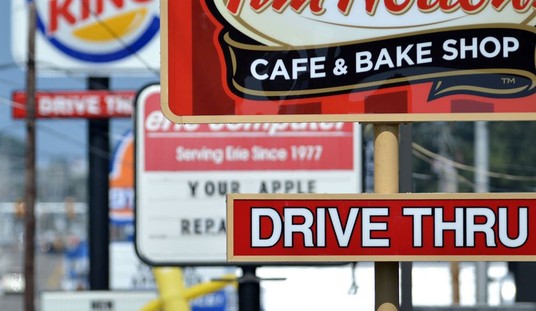There’s no better day than Labor Day to examine the nonsense that passes for high-minded economic policy proposals among the cognoscenti on the Left. To assist our examination is the erstwhile Secretary of Labor himself, the diminutive Robert Reich, who happens to be flogging a new book, “AFTERSHOCK: The Next Economy and America’s Future”, to be published in a couple of weeks. I can’t wait.
The Real Lesson of Labor Day
Face it: The national economy isn’t escaping the gravitational pull of the Great Recession. None of the standard booster rockets are working. Near-zero short-term interest rates from the Fed, almost record-low borrowing costs in the bond market, a giant stimulus package, along with tax credits for small businesses that hire the long-term unemployed have all failed to do enough.
That’s because the real problem has to do with the structure of the economy, not the business cycle. No booster rocket can work unless consumers are able, at some point, to keep the economy moving on their own. But consumers no longer have the purchasing power to buy the goods and services they produce as workers; for some time now, their means haven’t kept up with what the growing economy could and should have been able to provide them.
[emphasis added throughout]
Federal stimulus: booster rocket, or enema syringe? Keynesian economics had once been relegated to the dustbin of history, and we should not be surprised to be witnessing another failure in its current application. As Churchill said, “Those that fail to learn from history are doomed to repeat it.” Too bad Sir Winston is on the Obama Administration’s s*** list.
Reich goes on to attribute our current economic woes to an uneven distribution of wealth. The tech boom of the 90s outsourced much of our labor, you see, and the masses compensated for their income losses by working more hours and extracting $2.3 trillion in equity from their homes. (Which, if money were the sole problem, should have gone a long way toward fixing it.) Instead, all that wealth rolled uphill, concentrating in the wealthiest 1% of the population:
The economists Emmanuel Saez and Thomas Piketty examined tax returns from 1913 to 2008. They discovered an interesting pattern. In the late 1970s, the richest 1 percent of American families took in about 9 percent of the nation’s total income; by 2007, the top 1 percent took in 23.5 percent of total income.
O, for those halcyon days of the Carter Administration! What I recall of those pre-Reagan days is the Soviet threat, gasoline lines, 20% inflation, and a decade’s worth of negative returns in the stock market.
The Great Depression and its aftermath demonstrate that there is only one way back to full recovery: through more widely shared prosperity. In the 1930s, the American economy was completely restructured. New Deal measures — Social Security, a 40-hour work week with time-and-a-half overtime, unemployment insurance, the right to form unions and bargain collectively, the minimum wage — leveled the playing field.
Reich elides over the fact that none of those measures snapped the U.S. economy out of the Great Depression. 1937 is offered as the example of the double-dip recession we’re currently trying to avoid.
In the decades after World War II, legislation like the G.I. Bill, a vast expansion of public higher education and civil rights and voting rights laws further reduced economic inequality. [Huh? – ed.] Much of this was paid for with a 70 percent to 90 percent marginal income tax on the highest incomes. And as America’s middle class shared more of the economy’s gains, it was able to buy more of the goods and services the economy could provide. The result: rapid growth and more jobs.
In this twisted view of reality, the wealthiest Americans happily paid 70 to 90% of their top dollar in income tax because, to paraphrase his argument, “A falling tide lifts all boats.”
Mr Reich’s prescription?
We might consider, for example, extending the earned income tax credit all the way up through the middle class, and paying for it with a tax on carbon. … Consider how much our society now spends on such things as foreign wars designed to secure our sources of oil, as well as oil cleanups. [But BP’s shareholders are paying for the cleanup… oh, never mind. — ed.]
In other words, put 70% or so of the American population on the public dole, and scrap the pretense that Cap and Tax is anything other than a convenient vehicle for income redistribution.
Here’s another brilliant idea in a similar vein:
Another step would be to exempt the first $20,000 of income from payroll taxes and paying for it with a payroll tax on incomes over $250,000. This, too, seems reasonable, given that under current law only the first $106,000 of income is subject to the Social Security portion of the payroll tax – a particularly regressive system. Most higher-income people, who get good medical care, live longer and collect far more in Social Security benefits, than do lower-income people.
Ummm, it seems reasonable to take Social Security, which has always been sold as an insurance plan, and drop the pretense that it is anything other than another vehicle of income redistribution.
As if that’s not enough:
Early childhood education should be more widely available, paid for by a small 0.5 percent fee on all financial transactions. Public universities should be free; in return, graduates would then be required to pay back 10 percent of their first 10 years of full-time income.
Oh, my word! The “small 0.5 percent fee” shows how complete is Mr. Reich’s separation from reality. Find me a money market account that yields 0.5% per annum! And it takes no great measure of financial sophistication to understand that much of our economy depends on efficient financial markets; a 50 cent fee on every $100 transaction would cripple the very institutions that make our markets liquid and efficient.
Mr. Reich’s college payback scheme would combine two time-honored traditions of the Left: tithing (only with the government in the role of the church), and indentured servitude. In practice, the 10% surcharge on graduates’ salaries would serve to discourage gainful employment, but might serve to spur a renovation boom for the graduates’ parents’ basement apartments.
Mr. Reich concludes:
Here’s the point. Policies that generate more widely shared prosperity lead to stronger and more sustainable economic growth — and that’s good for everyone.
The rich are better off with a smaller percentage of a fast-growing economy than a larger share of an economy that’s barely moving. That’s the Labor Day lesson we learned decades ago; until we remember it again, we’ll be stuck in the Great Recession.
No, here’s the point, Mr. Reich. Our system of government depends on the consent of the governed. In our system, that top 1% (and perhaps more importantly, the slice between 30% and 1%) represents the job-creation dynamo for our economy. We burden it at our peril. No less luminary than Sen. John Kerry (D-MA) has shown us that the ultra-rich like paying taxes no more than the common man. In fact, they have the resources to (legally) avoid paying taxes that they deem to be unfair, by hiring accountants, tax lawyers, or by taking delivery of their foreign-made yachts in tax-friendly jurisdictions.
Failing that, many will check out of the system by retirement (full or partial) or by relocation.
Besides, it’s not the super-wealthy upon whom this new tax burden would fall; most of them are Heinz-Kerry style coupon-clippers, anyway. No, the brunt of the new taxes and redistributive schemes would fall upon the entrepreneurial class, the ones willing to gamble on their own skill or with who are trying to make it into that top 1%, but who haven’t made it yet. That’s the problem with our economy now, Mr. Reich: too many of these folks are afraid to risk their money because they realize that their financial success is not viewed by morons Democratic policy gurus like you, not as a solution, but as the root injustice of our system that must be expunged. Consequently, job growth is nonexistent
(It’s worth noting on this Labor Day that Mr. Reich’s resume is chock-full of academic and government policy positions, but nothing resembling a private sector J-O-B appears. Just like the bulk of Obama’s cabinet.)
Cross-posted at VladEnBlog .














Join the conversation as a VIP Member